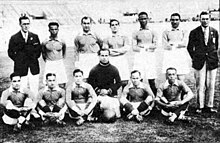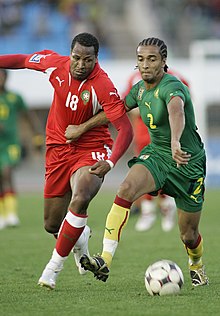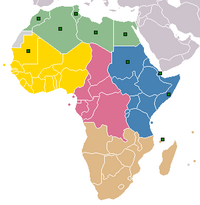Portal:Football in Africa
Introduction
Football is the most popular sport in Africa. Indeed, football is probably the most popular sport in every African country, although rugby and cricket are also very popular in South Africa. (Full article...)
This section may be unbalanced towards certain viewpoints. (October 2022) |

Selected article -
Kaizer Chiefs Football Club (often known as Chiefs) are a South African professional football club based in Naturena, Johannesburg South, that plays in the DStv Premiership. The team is nicknamed AmaKhosi, which means "Lords" or "Chiefs" in Zulu, and the Phefeni Glamour Boys. Chiefs have won 13 league titles (four in the PSL era) and over 42 cup trophies. The club's most recent trophy was the Shell Helix Ultra Cup trophy it won on 12 October 2019. As a result, they hold the most trophies amongst all clubs in South Africa and are the most successful team in South African football history since the start of the top flight in 1970. They are the most supported club in the country, drawing an average home attendance of 16,144 in the 2019–20 season, the highest in the league. It led to them being dubbed "The Biggest Club" in Southern Africa. The team plays its home matches at the 94,797-capacity FNB Stadium.
The team has a strong local rivalry with Orlando Pirates, a fellow Soweto team that Chiefs founder Kaizer Motaung played for in his early playing career. Famous players who donned the black-and-gold jersey in the past include former national team captains Neil Tovey and Lucas Radebe as well as Patrick Ntsoelengoe, Gary Bailey, John "Shoes" Moshoeu, Shaun Bartlett, Steve Komphela, Siyabonga Nomvete, and Doctor Khumalo.
Kaizer Chiefs were banned by the African Football (CAF) from competing in African club competitions until 2009 after their abrupt withdrawal from the 2005 CAF Confederation Cup. This was the second time in four years that Chiefs had been penalized by CAF for refusal to participate in a competition.
Selected biography -
Bolasie began his career with Rushden & Diamonds at the age of 16. He spent four months as a member of their youth team and then had a spell with Hillingdon Borough in the Southern Football League, before moving across Europe to play for Floriana in the Maltese Premier League. He returned to England in 2008 after being offered a trial with Plymouth Argyle, and impressed enough to be offered a two-year contract. He went on to play in the Football League for Plymouth Argyle, Barnet, Bristol City and Crystal Palace before joining Everton for a reported £25 million in 2016.
Bolasie was eligible to represent France, England and DR Congo internationally through birth, upbringing and heritage respectively. In January 2013 while playing in the Championship for Crystal Palace, Bolasie rejected the chance to represent the DR Congo in the 2013 Africa Cup of Nations claiming that he did not want to disrupt making progress in his club career. In March 2013, Bolasie was again called up to the Democratic Republic of Congo squad, and made his international debut in a 2014 World Cup qualification 0–0 draw with Libya.
Selected image -
 |
A public bus in Nairobi, Kenya bearing the name of Spanish footballer Diego Costa, pictured on 17 August 2014. Football in Kenya is controlled by the Football Kenya Federation (FKF), and the nation became a member of FIFA in 1960, prior to their independence in 1963.
Subcategories
Related portals
More sports portals
WikiProjects
Related task forces and sub-projects
African football task force
WikiProject Africa • WikiProject Football
WikiProject Football task forces and sub-projects
 | |
| Wikipedia ads | file info – #250 |
Topics
Open tasks

- Expand stubs: Competitions in Africa • Organizations
- Expand club articles of teams from Africa.
- Expand biographies of Africans involved in football.
- Create: Requested articles • Most wanted football articles • Requested general football articles
- Add: Infoboxes • Images (General requests, Requested images of people)
- Review: articles currently under review
- Assess: Assessment requests • Assess an article
- Revert vandalism on this portal and on African football articles
- Assist in maintaining this portal and keeping its selected content up to date.
- WikiNews: Create and submit news stories about African football for Wikipedia's sister project WikiNews.
Associated Wikimedia
The following Wikimedia Foundation sister projects provide more on this subject:
-
Commons
Free media repository -
Wikibooks
Free textbooks and manuals -
Wikidata
Free knowledge base -
Wikinews
Free-content news -
Wikiquote
Collection of quotations -
Wikisource
Free-content library -
Wikiversity
Free learning tools -
Wiktionary
Dictionary and thesaurus
More portals
Sources

- ^ "The History Of Soccer In Africa". NPR.org. 2010-06-09. Retrieved 2016-03-31.
- ^ a b c Alegi, Peter (2010). African Soccerscapes. Ohio University Press. pp. 1–2. ISBN 9780896802780.
- ^ Frimpong, Enoch Darfah. "Ghana news: A world of superstition, frustration and disillusionment - Graphic Online". Retrieved 23 September 2017.
- ^ Lacey, Marc (8 August 2002). "Kangemi Journal; For Spellbinding Soccer, the Juju Man's on the Ball". The New York Times. NY Times. Retrieved 2016-03-31.
- ^ "World Cup Witchcraft: Africa Teams Turn to Magic for Aid". National Geographic. Archived from the original on July 10, 2006. Retrieved 2016-03-31.
- ^ Andy Mitten (September 2010). The Rough Guide to Cult Football. Rough Guides UK. ISBN 9781405387965. Retrieved 2016-04-02.
- ^ "African Nations Cup overshadowed by hocus pocus | Football". The Guardian. Retrieved 2016-04-09.
- ^ Kuper, Simon (2006). Soccer Against the Enemy: How the World's Most Popular Sport Starts and Stops Wars, Fuels Revolutions, and Keeps Dictators in Power. Nation Books. p. 123. ISBN 978-1-56025-878-0.

























